Editor’s Note:
Parshat Ha’azinu takes place in the book of Deuteronomy (Devarim), Chapter 32:1-52. This is the very last weekly reading in the entire Torah, and it contains a lengthy poem known as the Song of Moses or Shirat Ha’azinu: Moses’ very last words to the people Israel before he dies.
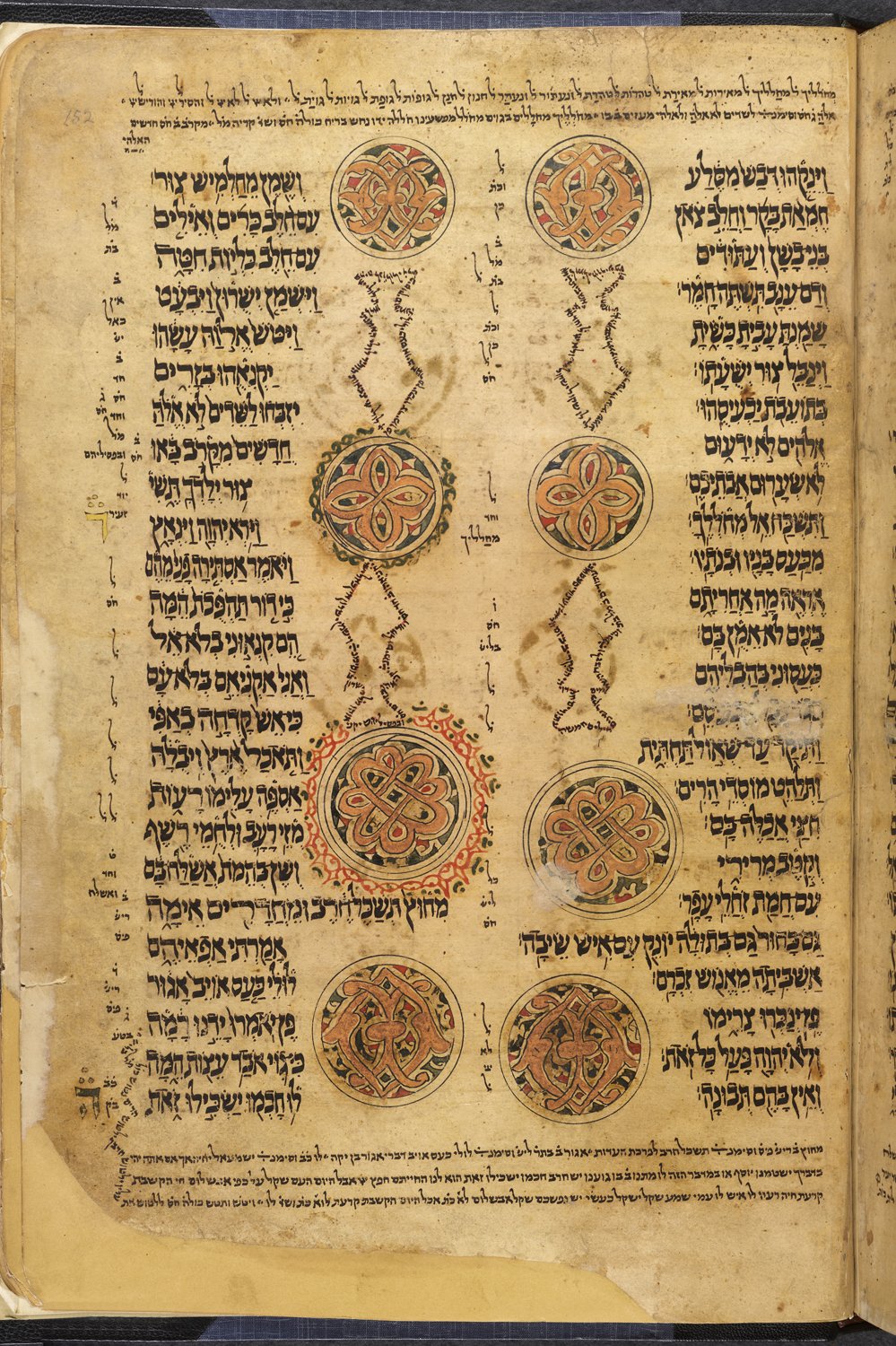
An illuminated manuscript of Deuteronomy 32, Yemen, 1469. Image via the British Library.
In the original Masoretic scroll, the poem’s 43 verses appear in the unique format of two vertical columns. (Find out more here.) The illuminated manuscript above, from the British Library, dates from Yemen in the year 1469. It clearly shows the two separate columns of Moses’ poetic address. In order to accentuate the unusual textual arrangement, the scribe, whose name was Benaiah ben Saadia ben Zachariah ben Marga, has decorated the space between the columns with colorful palmettes and micrographic fish, whose shapes are themselves made up of smaller Hebrew words.
Like the 15th-century scribe who copied Moses’ song, the ancient commentators whose insights are recorded in Sifre Devarim also pay very close attention to these monumental verses. Specifically, they are interested in the use of rain and dew in Deuteronomy 32:2. This verse reads in full: “Let my teaching drip like rain, let my discourse flow like dew, like the cloud-bursts upon the herbs, like droplets on the grass.”
The ancient commentators act much like Benaniah ben Saadia as he decorated the middle of the manuscript page: they, too, take the original Deuteronomy text and fill in the space between the words. Their voices, recorded in the 4th-century Sifre Devarim and buried for centuries in the Cairo Geniza, come alive again in Marty Jaffee’s new translation, available now as an e-book from the UW Stroum Center for Jewish Studies.
Here, we present two translated selections from the Sifre Devarim, along with the original Hebrew. This excerpt comes from Pisqa (chapter) 306, wherein the commentators dig into Deuteronomy 32:2, the beginning of Moses’ epic poem addressed to his people. Beth Huppin offers study questions to help readers engage more deeply with the text. Thanks to Beth and, of course, to Marty Jaffee for bringing this special form of midrash to our readers.
–H.P.
Reading the Sifre Devarim: Part 1
The Metaphor of Rain: The Same Rain Produces Many Kinds of Plants!
Translation by Dr. Marty Jaffee, Study Questions by Beth Huppin
Pisqa 306, 9
כמטר. מה מטר חיים לעולם אף דברי תורה חיים לעולם. אי מה מטר מקצת עולם שמחים ומקצת עולם עצבים בו מי שבורו וגתו מלא יין וגתו וגרנו לפניו מצירי׳ לו אף דברי תורה כן ת״ל תזל כטל אמרתי. מה טל כל העולם כולו שמחים בו אף דברי תורה כל העולם כולו שמחים בו
“Let my teaching drip like rain” (Dt.32:2)—
just as rain
so, too, words of Torah [bring] life to the world.
Or: just as with rain,
part of the world rejoices in it,
while part of the world suffers from it,
so, too, one whose cistern is full of wine—
or one whose threshing floor is full before him—
[may find the rain inconvenient].Is it possible to say that
this applies to words of Torah as well ?
The Teaching states:
“Let my discourse flow like dew” (Dt.32:2)—
just as with dew, all of the world rejoices in it,
so, too, with words of Torah, all the world rejoices in them.
Questions to Consider:
-
What makes dew different than other kinds of rain?
-
What does this teaching assume about how one should teach – and receive – Torah?
Pisqa 306, 16
ד״א “יערף כמטר לקחי” (דברים לב:ב) מה מטר זה יורד על האילנות ונותן בהם מטעמים לכל אחד ואחד לפי מה שהם בגפן לפי מה שהם בזית לפי מה שהן בתאינה כך דברי תורה כולם אחת ויש בהם מקרא ומשנה הלכות ואגדות:
“כשעירים עלי דשא.” (דברים לב:ב) מה שעירים הללו יורדים על עשבים ומעלים אותם ויש בהם ירוקים ויש בהם אדומים ויש בהם שחורים כך דברי תורה יש בהן רבנים יש בהן כשרים יש בהן חכמים ויש בהם צדיקים ויש בהם חסידים.
ד״א “יערף כמטר” (דברים לב:ב) מה המטר הזה אי אתה רואהו עד שבא וכן הוא אומר (מ״א יח:מה) “ויהי עד כה ועד כה והשמים התקדרו בעבים” כך תלמידי חכמים אי אתה יודע מהם עד שישנה משנה הלכות ואגדות או עד שיתמנה פרנס על הצבור.
“May my teaching drip like rain” (Dt.32:2).
Just as your rain descends upon the trees,
giving each and every one a unique flavor of its own:
to the grapevine, a unique flavor;
to the olive tree, a unique flavor,
to the fig tree, a unique flavor—
just so, words of Torah are all identical in substance,
but take the form of Scripture-declamation[i]
and the oral-performative tradition,[ii]
dialectics,[iii] legal traditions,[iv]
and lore.[v]
“Like the cloud-bursts upon the herbs” (Dt.32:2).
Just as your cloud-bursts descend upon the herbs,
causing them to sprout—
and some are red, and some are green,
and some are dark, and some are white,
So, too, words of Torah
[nurture diverse students]—some of them are wise,[vi] some are morally fit,[vii]
some are righteous,[viii] and some are truly pious.[ix]
Another word:
Just as you can’t see your rain until it comes—
and in this vein, He says:
“In the meantime, the Heavens blackened with clouds” (1Ki.18:45)—
so, too, with a disciple of sages,
you can’t know what he’s made of until he performs
Scriptural hermeneutics,[x]
legal traditions, and lore.
Or until he accepts responsibility for communal well-being.
Footnotes:
[i] Heb: miqr’a, “that which is declaimed.”
[ii] Heb: mishnah, “that which is repeated.”
[iii] Heb: Talmud, “that which is learned.”
[iv] Heb: halachot, “legal rulings.”
[v] Heb: aggadot, “narratives.”
[vi] Heb: khachamim, “wise ones.”
[vii] Heb: kesheirim, “those who are qualified.”
[viii] Heb: tzadikim, “the righteous ones.”
[ix] Heb: khasidim, “pious ones.”
[x] Heb: midrash, “interpretation, exegesis.”
Questions to Consider:
-
This section has 3 parts to it. What does each section teach that is unique?
-
This text does not judge what is best: grapevines, olive trees, fig trees; different kinds of herbs; different kinds of people. Why do we feel the need to judge each other? What does this judgment do to our community? How could this teaching help us avoid judgment of others? Is this important? What if others judge us? How can we avoid judging them? Is judgment sometimes necessary?
-
How do you understand the final section? Do you agree? Who do you think of as a “disciple of sages” in our community today?
Links for Further Exploration
- Sifre Devarim: New E-Book Translation by Marty Jaffee
- Marty Jaffee Brings Rabbinic Voices from the Cairo Geniza to the E-book (Dec. 21, 2015)


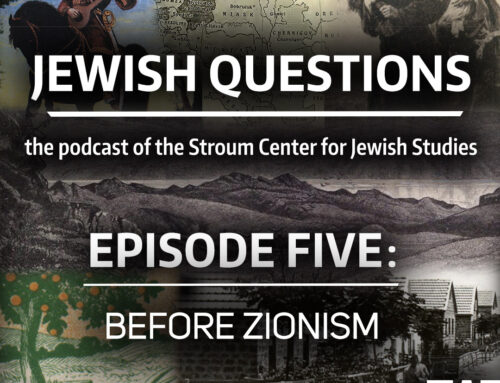
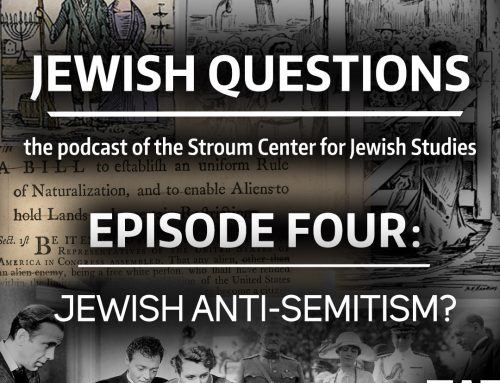
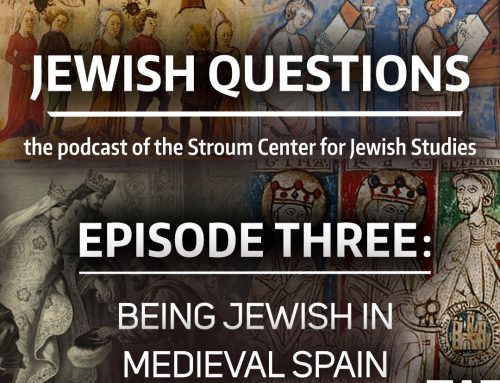

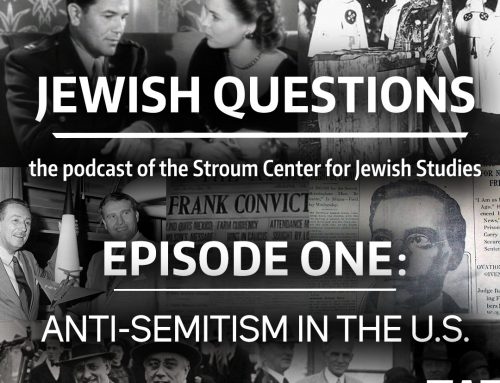
Leave A Comment